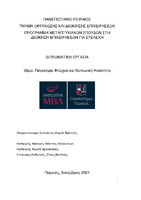Παγκόσμια φτώχεια και κοινωνική ανισότητα

Προβολή/
Περίληψη
Η πανδημία COVID-19 έφερε μεγάλες αλλαγές ως προς την οικονομική ανάπτυξη μειώνοντας το κατά κεφαλήν ΑΕΠ σε όλο το κόσμο. Ως αποτέλεσμα της πανδημίας, πολλές εργατοώρες ανά την υφήλιο χάθηκαν προκαλώντας μείωση του Ακαθάριστου Εθνικού Εισοδήματος όλων τω χωρών. Πολλά άτομα που βρισκότανε στα κυρίως χαμηλά οικονομικά στρώματα επλήγησαν σοβαρά από την πανδημία και οδηγήθηκαν σε συνθήκες φτώχειας αμβλύνοντας ακόμα περισσότερο την Οικονομική και Κοινωνική Ανισότητα. Αν και ήμαστε στον εικοστό πρώτο αιώνα, η πρόσβαση στη τουαλέτα και στο φαγητό δε θεωρούνται δεδομένα για όλο τον ανθρώπινο πληθυσμό.
Η πτώση βέβαια του Ακαθάριστου Εγχώριου Προϊόντος σε παγκόσμιο επίπεδο, όπως θα δούμε, δεν οδήγησε σε μείωση του Παγκόσμιου Πλούτου. Ο νεοφιλελεύθερος καπιταλισμός ο οποίος επικράτησε από τη δεκαετία του 1980 και μετά, οδήγησε σε συγκέντρωση του πλούτου στα υψηλότερα επίπεδα της πυραμίδας κατανομής πλούτου. Χώρες που αναπτύχθηκαν τα τελευταία 40 χρόνια όπως η Κίνα και η Ιαπωνία, συγκεντρώνουν τους περισσότερους εκατομμυριούχους μετά τη Βόρεια Αμερική και την Ευρώπη. Και ενώ οι ανισότητες μεταξύ των μέσων εθνικών εισοδημάτων είναι μεγάλες, υπάρχουν επίσης σημαντικές ανισότητες μεταξύ των ανθρώπων που βρίσκονται στο κάτω και στην κορυφή της κατανομής του εισοδήματος μεταξύ και εντός των χωρών. Χαρακτηριστικό στοιχείο της ανισότητας είναι το γεγονός ότι το πλουσιότερο 1% του κόσμου, συγκεντρώνει στη κατοχή του το 43,4% του παγκόσμιου πλούτου.
Σκοπός της παρούσας διπλωματικής εργασίας είναι να μελετηθούν οι παγκόσμιες τάσεις σε περιουσιακά στοιχεία και χρέη ανά ενήλικα, το Ακαθάριστο Εγχώριο Προϊόν (ΑΕΠ) ο Πληθωρισμός, οι επενδύσεις και οι αποταμιεύσεις καθώς και ο συντελεστής GINI που μετρά την ανισότητα. Αναλύει πως εξηγείται, η Φτώχεια και η Κοινωνική Ανισότητα μέσα από τη ματιά των οικονομολόγων καθώς και τι προτείνεται έτσι ώστε η ανισότητα να μειωθεί στο μέλλον.
Επίσης, μελετάται η οικονομική ανισότητα στην Ευρώπη και πως η χρηματοπιστωτική κρίση επηρέασε την ανισότητα. Γίνεται σύγκριση των εισοδημάτων ανάμεσα στις ανεπτυγμένες και τις αναπτυσσόμενες χώρες της Ευρωπαϊκής Ένωσης και πως η εισοδηματική ανισότητα λειτουργεί θετικά ή αρνητικά σε αυτές.
Τέλος, επικεντρώνεται στη περίπτωση της Ελλάδας, σε σύγκριση με τις υπόλοιπες Ευρωπαϊκές χώρες, καθώς και πως η πανδημία COVID 19 επηρέασε την ανισότητα στο σύνολο αλλά και ανά ομάδα πληθυσμού.


